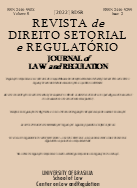Regulação responsiva em contratos de compartilhamento de infraestrutura de Serviço Móvel Pessoal
entre a regulação setorial de telecomunicações e a política antitruste
Schlagworte:
Regulação Responsiva. Regulação de telecomunicações. Política antitruste. Serviços de telefonia móvel. Acordos de compartilhamento de redes.Abstract
[Propósito] O presente estudo se destina a investigar a natureza responsiva da regulação de contratos de compartilhamento de infraestrutura (CCIs) de serviço móvel pessoal (SMP), que pode ser evidenciada tanto pelo corpo regulatório da Agência Nacional de Telecomunicações (ANATEL), sob a Lei nº 9.472/1997, a Lei Geral de Telecomunicações (LGT), quanto pela mudança abordagem empreendida pelo Conselho Administrativo de Defesa Econômica (CADE) na análise de Atos de Concentração (ACs) relativos a esse tipo de arranjo contratual. Dessa maneira, o recrudescimento do CADE no tratamento de CCIs de SMP parece indicar uma escalada em uma pirâmide de incentivos e sanções estabelecida pelas previsões regulatórias da ANATEL sobre o tema – de natureza amplamente autorizativa, ainda que com indicativos claros de comportamentos desejáveis e indesejáveis pelos agentes regulados –, diante do crescimento de ameaças ao bem-estar de consumidores (art. 88, 5º, §5º, Lei nº 12.529/2011) e, consequentemente, à universalização e qualidade de serviços de telecomunicações (art. 2º, LGT) – ponto de encontro entre os objetivos de ambas as políticas regulatórias específicas.
Downloads
Literaturhinweise
ARANHA, M. (2016). Telecommunications Regulatory Design in Brazil: Networking around State Capacity Deficits. Economia Pubblica, 25(2), 83-105.
Baldwin, R., Cave, M., Lodge, M. (Eds.). (2010). The Oxford Handbook of Regulation. Oxford: Oxford University Press.
Baldwin, R. Black, J. (2010). Really Responsive Regulation. The Modern Law Review, 71(1), 59-94.
BEREC. (2018). BEREC Report on infrastructure sharing. Riga: BEREC.
Black, J. (2002). Critical Reflection on Regulation. London: London School of Economics.
Black, J. (2005). Proceduralisation and polycentric regulation [Special issue]. Revista Direito GV, 99-130.
Bork, R. (1993). The antitrust paradox: a policy at war with itself. Nova York: Free Press.
Braithwaite, J. (2005). Responsive Regulation and Developing Economies. World Development, 44(3), 884-898.
Braithwaite, J. (2010). The essence of responsive regulation. UBC Law Review, 34(5), 475-520.
Braithwaite, J. (2011). The Regulatory State? In Goodin, R. (Ed.) The Oxford Handbook of Political Science. Oxford: Oxford University Press.
CADE. (2016). Guia para a análise de atos de concentração horizontal. Brasília: CADE.
Coase, R. (1937). The Nature of the Firm. Economica, 4(16), 386-405.
Colomo, P. (2010). On the Application of Competition Law as Regulation: Elements for a Theory. Yearbook of European Law, 29(1), 261-306.
Fox, E. (2013). Against Goals. New York University School of Law, 81(5), 2157-2161.
Fox, E. (1981). Modernization of Antitrust: A New Equilibrium. Cornell Law Review, 66(6), 1140-1192.
Hovenkamp, H. (2019). Competition Policy for Labour Markets. University of Pennsylvania Institute for Law and Econ Research Paper, 19-29.
Hovenkamp, H. (1988). Labor Conspiracies in American Law, 1880-1930. Texas Law Review, 66(5), 919-965.
Hovenkamp, H. (2022). Worker Welfare and Antitrust.
Khan, L. (2018). The Ideological Roots of America's Market Power Problem. The Yale Law Journal Forum, 127, 960-979.
Khan, L. (2021). Making Competition Work: Promoting Competition in Labor Markets. Washington, D.C.: Federal Trade Commission.
Kolieb, J. (2015). When to Punish, When to Persuade and When to Reward: Strengthening Responsive Regulation with the Regulatory Diamond. Monash University Law Review, 41(1), 136-162.
Maiolino, I. (2019). A regulação pode ser anticompetitiva? Uma análise do mercado de capitais a partir do caso Cetip/BVMF. Journal of Law and Regulation, 5(2), 27-52.
Marinescu, I.; Hovenkamp, H. (2019). Anticompetitive Mergers in Labor Markets. Indiana Law Journal, 94, 1031-1063.
Mascini, P. (2013). Why was the enforcement pyramid so influential? And what price was paid? Regulation and Governance, 7, 48-60.
Pereira Neto, C. (2005). Development Theory and Foundations of Universal Access Policies. I/S: A Journal of Law and Policy, 2(2) 365-408.
Pereira Neto, C.; Adami, M.; Schimitd, M. (2022). Regulação responsiva: novas fronteiras da regulação ecconômica no processo de acompanhamento e controle do setor de telecomunicações? In Timm, L. and França, M. (Eds.) A nova regulação econômica. São Paulo: Centro de Estudos de Direito Econômico e Social.
Piofsky, R. (1979). The political content of antitrust. University of Pennsylvania Law Review, 127, 1051-1075.
Posner, R. (1979). The Chicago School of antitrust analysis. University of Pennsylvania Law Review, 127, p. 925-948.
Ros, L. (2022). Crise quanto aos objetivos do direito da concorrência: é hora de levar o barco devagar. In Athayde, A., Segalovich, D. and Andrade, G. (Eds.). Comercio Internacional e Concorrência: desafios e perspectivas atuais.
Ros, L. (2014). Conflito de competência entre CADE e BACEN na análise de atos de concentração: perspectiva histórica e crítica ao PLP. 265/2007. Brasília: Universidade de Brasília, Brasília.
Schapiro, M. and Bacchi, F. (2013). Análise dos Atos de Concentração no Brasil: forma, função e o incrementalismo reformista do CADE. In Schapiro, M., Carvalho, V. and Cordovil, L. (Eds.). Direito econômico concorrencial. São Paulo: Saraiva.
Teachout, Z. and Khan, L. (2014). Market Structure and Political Law: A Taxonomy of Power. Duke Journal of Constitutional Law and Public Policy, 9(1), 37-74.
Trubnikov, D. (2017). Regulation of Telecommunications: The Choice Between Market and Regulatory Failures. Law, State and Telecommunications Review, 9(1), 25-46.
Williamson, O. (1968). Economies as an antitrust defense: the welfare tradeoffs. The American Economic Review, 58(1), 18-36.
Wu, T. (2018). The curse of bigness: antitrust in the New Gilded Age. Nova York: Columbia Global Reports.
Wu, T. (2018). The “Protection of the Competitive Process” Standard. Columbia Public Law Research Paper, 14-612.
Downloads
Veröffentlicht
Zitationsvorschlag
Ausgabe
Rubrik
Lizenz
Copyright (c) 2022 Journal of Law and Regulation

Dieses Werk steht unter der Lizenz Creative Commons Namensnennung 4.0 International.
Ao submeter seu artigo à Revista de Direito, Estado e Telecomunicações, declaro aceitar a licença de publicação Creative Commons Attribution 4.0 International (CC BY 4.0), disponível em http://creativecommons.org/licenses/by/4.0.


